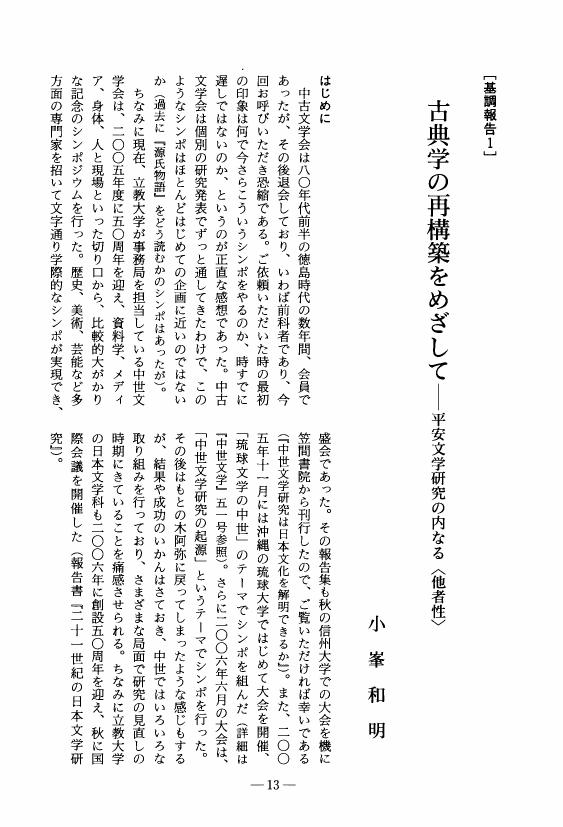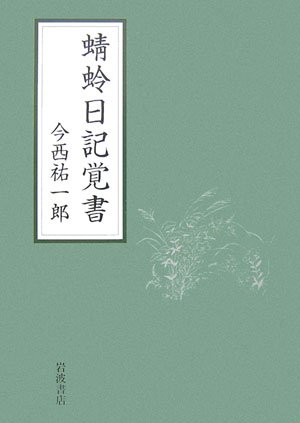10 0 0 0 IR 『源氏物語』はなぜ帝妃の密通を書くことができたか
- 著者
- 今西 祐一郎
- 出版者
- 大阪府立大学日本言語文化学会
- 雑誌
- 百舌鳥国文 (ISSN:02853701)
- 巻号頁・発行日
- vol.20, pp.33-46, 2009-03-31
9 0 0 0 OA 国文研ニューズ No.31 SPRING 2013
- 著者
- 今西 祐一郎 伊藤 鉄也 鈴木 淳 青田 寿美 呉 格 太田 尚宏 寺島 恒世 谷川 惠一
- 出版者
- 人間文化研究機構国文学研究資料館
- 雑誌
- 国文研ニューズ = NIJL News (ISSN:18831931)
- 巻号頁・発行日
- no.31, pp.1-16, 2013-05-10
●メッセージ国文学研究資料館41年●研究ノート『和泉式部日記jの本文異同への新視点一傍記混入から見えてくるもの-合羽摺り絵本『彩色画選』とカラリスト松寿堂「蔵書印データベース」にできること-つながるデータ、可視化する書脈『中国古籍総目』の編纂について●トピックス平成24年度日本古典籍講習会人間文化研究機織連携展示「記憶をつなぐ一津波災害と文化遺産一」国文学研究資料館常設展示「和書のさまざま」百人一首たまてばこ平成25年度アーカイブズカレッジ(史料管理学研修会通算第59回)の開催新収資料紹介総合研究大学院大学日本文学研究専攻の近況.
7 0 0 0 源氏物語の助動詞の計量分析
- 著者
- 村上 征勝 今西 祐一郎
- 出版者
- 一般社団法人情報処理学会
- 雑誌
- 情報処理学会論文誌 (ISSN:18827764)
- 巻号頁・発行日
- vol.40, no.3, pp.774-782, 1999-03-15
- 参考文献数
- 5
- 被引用文献数
- 9 16
『源氏物語』は 我が国古典の最高峰であるばかりでなく その芸術性の高さゆえに諸外国にも広く翻訳され 古くから数多くの研究がなされてきた. しかしながら現時点においても なお研究課題は数多く存在し たとえば 複数作者説や成立過程等 依然として未解決のまま持ち越されているものも多い。本論文では 微妙な表現価値にかかわる助動詞を取り上げ その『源氏物語』における出現頻度を分析し その結果 巻の成立順序や 後半の10巻 いわゆる「宇治十帖」他作者説が生ずる理由等との関連の可能性について次の結果を得た。源氏物語は話の内容から3部に分けるのが通説となっているが (1) 源氏物語の第1部を構成する紫の上系17巻と玉鬘系16巻は別々に成立した可能性がある. その場合 玉鬘系の16巻は第2部の後に成立した可能性が高い. (2)「宇治十帖」とその前の11巻 (第2部および「匂宮三帖」)との間には助動詞の用い方に差が見られ この差が文体の違いの反映であるならば これが1宇治十帖」他作者説が生ずる原因の1つと考えられる。(3) 各巻の文章を会話文と地の文に分けた場合に 助動詞の用い方に差が出るのは地の文である.Genji Monogatari, the greatest accomplishment in Japanese classical literature, has been the subject of intensive studies for many centuries. In spite of these studies, there are a great number of unsolved problems concerning the time sequence of the writing of the 54 chapters and their author ship. The 54 chapters of the Genji Monogatari are divided into three distinctive parts. We analyzed auxiliary verbs used in these three parts and got the following results. (1) The two stories which constitute the first part may have been written at different times. Tamakazura story of the first part may have been written after the second part. (2) The apparent difference in the use of auxiliary verbs between Uji Jujo (Ten chapters of Uji) and the 11 chapters that precede them throw doubt upon the singular authorship of Genji Monogatari. (3) The differences in use of auxiliary verbs between chapters are irrelevant to the amount of conversation.
4 0 0 0 OA 『源氏物語』はなぜ帝妃の密通を書くことができたか
- 著者
- 今西 祐一郎
- 出版者
- 大阪府立大学日本言語文化学会
- 雑誌
- 百舌鳥国文 (ISSN:02853701)
- 巻号頁・発行日
- vol.20, pp.33-46, 2009-03-31
4 0 0 0 OA 国文研ニューズ No.36 SUMMER 2014
- 著者
- 今西 祐一郎 大高 洋司 加藤 聖文 山本 登朗 入口 敦志 神作 研一 谷川 惠一 田中 大士
- 出版者
- 人間文化研究機構国文学研究資料館
- 雑誌
- 国文研ニューズ = NIJL News (ISSN:18831931)
- 巻号頁・発行日
- no.36, pp.1-16, 2014-08-01
●メッセージ「日本語の歴史的典籍の国際共同研究ネットワーク構築計画」始まる●研究ノート「八戸南部家の読本収集」余滴世界のアーカイブズをめぐって特定研究「中世古今集注釈書の総合的研究―「毘沙門堂本古今集注」を中心に―」●トピックス連続講座「くずし字で読む『源氏物語』」山鹿積徳堂文庫シーボルトに近づく楽しみ特別展示「中原中也と日本の詩」平成26年度 国文学研究資料館「古典の日」講演会刊行物の紹介第38回国際日本文学研究集会総合研究大学院大学日本文学研究専攻の近況
2 0 0 0 IR 「とりつくろひかゝはる」考--『蜻蛉日記』本文批判
- 著者
- 今西 祐一郎
- 出版者
- 九州大学国語国文学会
- 雑誌
- 語文研究 (ISSN:04360982)
- 巻号頁・発行日
- no.94, pp.53-62, 2002-12
2 0 0 0 OA 源氏物語の助動詞の計量分析
- 著者
- 村上 征勝 今西 祐一郎
- 雑誌
- 情報処理学会論文誌 (ISSN:18827764)
- 巻号頁・発行日
- vol.40, no.3, pp.774-782, 1999-03-15
『源氏物語』は 我が国古典の最高峰であるばかりでなく その芸術性の高さゆえに諸外国にも広く翻訳され 古くから数多くの研究がなされてきた. しかしながら現時点においても なお研究課題は数多く存在し たとえば 複数作者説や成立過程等 依然として未解決のまま持ち越されているものも多い。本論文では 微妙な表現価値にかかわる助動詞を取り上げ その『源氏物語』における出現頻度を分析し その結果 巻の成立順序や 後半の10巻 いわゆる「宇治十帖」他作者説が生ずる理由等との関連の可能性について次の結果を得た。源氏物語は話の内容から3部に分けるのが通説となっているが (1) 源氏物語の第1部を構成する紫の上系17巻と玉鬘系16巻は別々に成立した可能性がある. その場合 玉鬘系の16巻は第2部の後に成立した可能性が高い. (2)「宇治十帖」とその前の11巻 (第2部および「匂宮三帖」)との間には助動詞の用い方に差が見られ この差が文体の違いの反映であるならば これが1宇治十帖」他作者説が生ずる原因の1つと考えられる。(3) 各巻の文章を会話文と地の文に分けた場合に 助動詞の用い方に差が出るのは地の文である.
2 0 0 0 OA 「小学校向け和本レクチャー」実施報告――鶴見大学図書館・神奈川県立図書館による――
- 著者
- 久保木 秀夫 今西 祐一郎
- 雑誌
- 日本語の歴史的典籍の国際共同研究ネットワーク構築計画 国文研主導共同研究「青少年に向けた古典籍インターフェースの開発」報告書――初中等学校における古典教育―― = Classical Education in Primary Schools
- 巻号頁・発行日
- pp.3-12, 2017
大学共同利用機関法人 人間文化研究機構 国文学研究資料館
1 0 0 0 IR 道綱母「嘆きつつひとりぬる夜」歌の詠作事情
- 著者
- 今西 祐一郎
- 出版者
- 九州大学大学院人文科学研究院
- 雑誌
- 文学研究 (ISSN:03872823)
- 巻号頁・発行日
- vol.98, pp.1-15, 2001-03
1 0 0 0 OA 『伊勢物語』を考え直す
1 0 0 0 OA 〈中古文学〉の将来 研究・学会・社会
1 0 0 0 OA 国文研ニューズ No.15 SPRING 2009
- 著者
- 今西 祐一郎 鈴木 淳 加藤 聖文 鈴木 淳
- 出版者
- 人間文化研究機構国文学研究資料館
- 雑誌
- 国文研ニューズ = NIJL News (ISSN:18831931)
- 巻号頁・発行日
- no.15, pp.1-16, 2009-06-01
●メッセージ新館長の挨拶●研究ノート国際シンポジウム「日本文学の創造物」東アジアの歴史研究とアーカイブズ研究対談 マティ・フォラー●トピックス平成21年度の講演会・展示ポルトガルにおける日本資料専門家欧州協会年次会議大学共同利用機関法入人間文化研究機構 連携展示「百鬼夜行の世果」開催のご案内久保木秀夫助教の中古女学会賞の受賞相田満助教の山下記念研究賞受賞総研大日本文学研究専攻の近況表紙絵紹介『朝鮮総督府文書』
1 0 0 0 OA 国語史教育と古典教育
- 著者
- 山中 延之 今西 祐一郎
- 雑誌
- 日本語の歴史的典籍の国際共同研究ネットワーク構築計画 国文研主導共同研究「青少年に向けた古典籍インターフェースの開発」報告書――初中等学校における古典教育―― = Classical Education in Primary Schools
- 巻号頁・発行日
- pp.120-129, 2017
大学共同利用機関法人 人間文化研究機構 国文学研究資料館
1 0 0 0 OA 国文研ニューズ No.19 SPRING 2010
- 著者
- 今西 祐一郎 ハルオ シラネ 久保 木秀夫 赤澤 真理 ファビアン ・アリバート・ナルス 伊藤 鉄也 坂口 貴弘 中村 康夫
- 出版者
- 人間文化研究機構国文学研究資料館
- 雑誌
- 国文研ニューズ = NIJL News (ISSN:18831931)
- 巻号頁・発行日
- no.19, pp.1-16, 2010-04-26
●メッセージ法人化後第1期から第2期へ国文学研究資料館とコロンビア大学の協力協定の意味●研究ノート国文学研究資料館蔵古筆手鑑2点の紹介 その1中近世における古代寝殿造理解一理想の住宅像と考証研究―●トピックス日本文化とロランバルトのフォトバイオグラフィー公開開始 与謝野晶子の源氏訳自筆原稿画像データベース研究集会「アーカイブズ編成の理論と実践」の開催当館所蔵「春日懐紙」の重文指定について平成22年度展示会・講演会等平成22年度アーカイブズカレッジ(史料管理学研修会通算第56回)の開催総研大日本文学研究専攻の近況表紙絵紹介『伊勢物語』
1 0 0 0 「蜻蛉日記」序跋考 (王朝文学再読<特集>)
- 著者
- 今西 祐一郎
- 出版者
- 岩波書店
- 雑誌
- 文学 (ISSN:03894029)
- 巻号頁・発行日
- vol.55, no.10, pp.p38-53, 1987-10
1 0 0 0 IR 通俗と啓蒙 : 江戸時代出版史一斑
- 著者
- 今西 祐一郎
- 出版者
- 成城大学
- 雑誌
- 成城国文学 (ISSN:09110941)
- 巻号頁・発行日
- no.30, pp.1-19, 2014-03
1 0 0 0 源氏物語の文章の統計分析
- 著者
- 村上 征勝 上田 英代 今西 祐一郎 樺島 忠夫 藤田 真理 上田 裕一
- 出版者
- 一般社団法人情報処理学会
- 雑誌
- 情報処理学会研究報告人文科学とコンピュータ(CH) (ISSN:09196072)
- 巻号頁・発行日
- vol.1996, no.73, pp.33-38, 1996-07-26
- 被引用文献数
- 8
『源氏物語』の複数著者説や54巻の成立順序に関する疑問を、文章の統計分析という観点から解明しようと研究を行っている。この小論では、『源氏物語』の文体の安定性という観点から、特に後半の10巻の「宇治十帖」他作家説を中心に、いくつかの分析結果について報告する。One of the important questions regarding Genji Monogatari to the one concerning the author, that is, Murasaki Shikibu (Lady Murasaki) is the author of last ten volumes of Genji Monogatari. Another issue concerns the time sequence in which there 54 volumes were written. We are now trying to solve these questions by means of quantitative analysis of sentences. In this paper, we would like to present what has been derived from our study mainly in conjunction with the stability of the writing style of Murasaki Shikibu.


